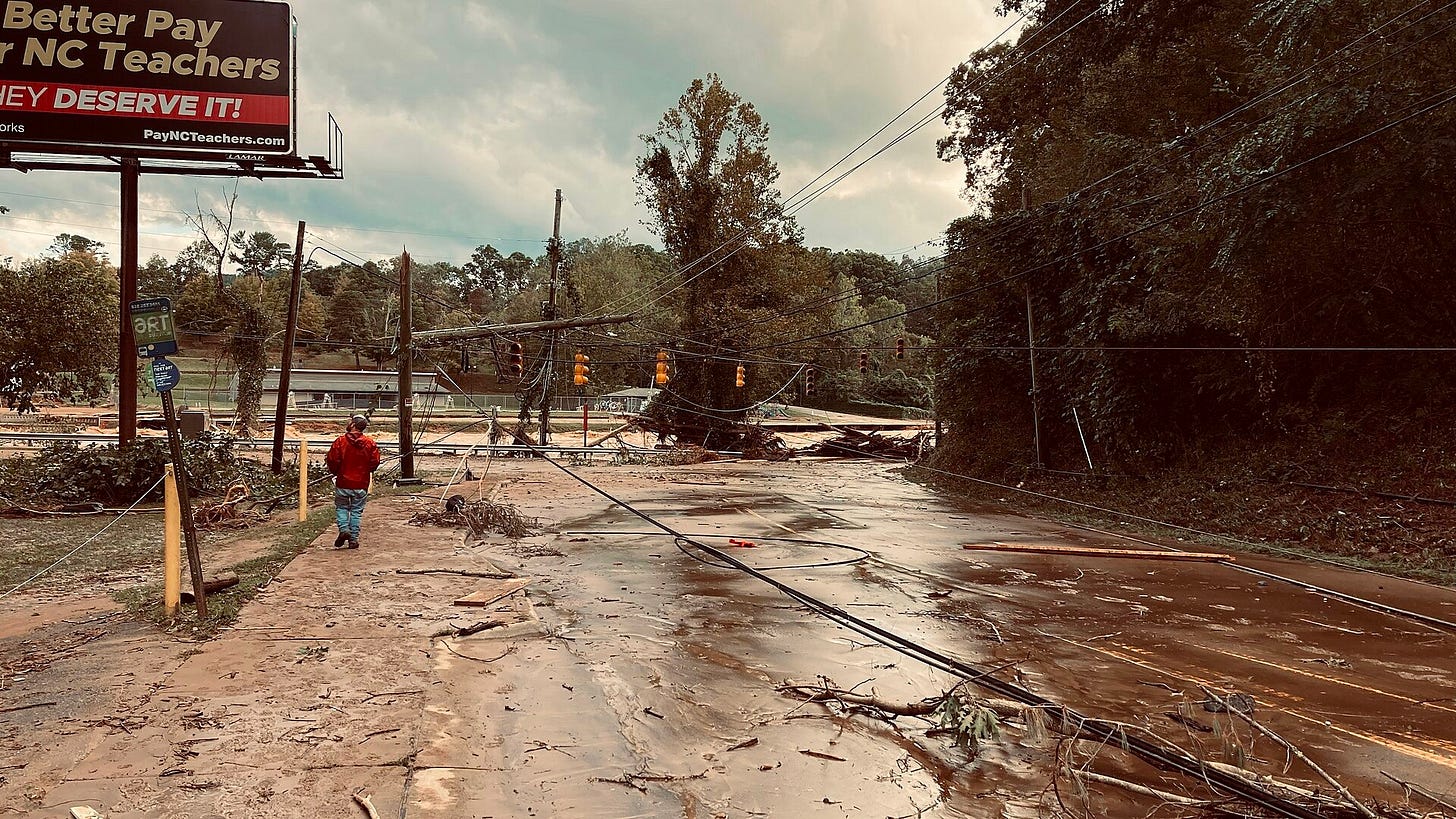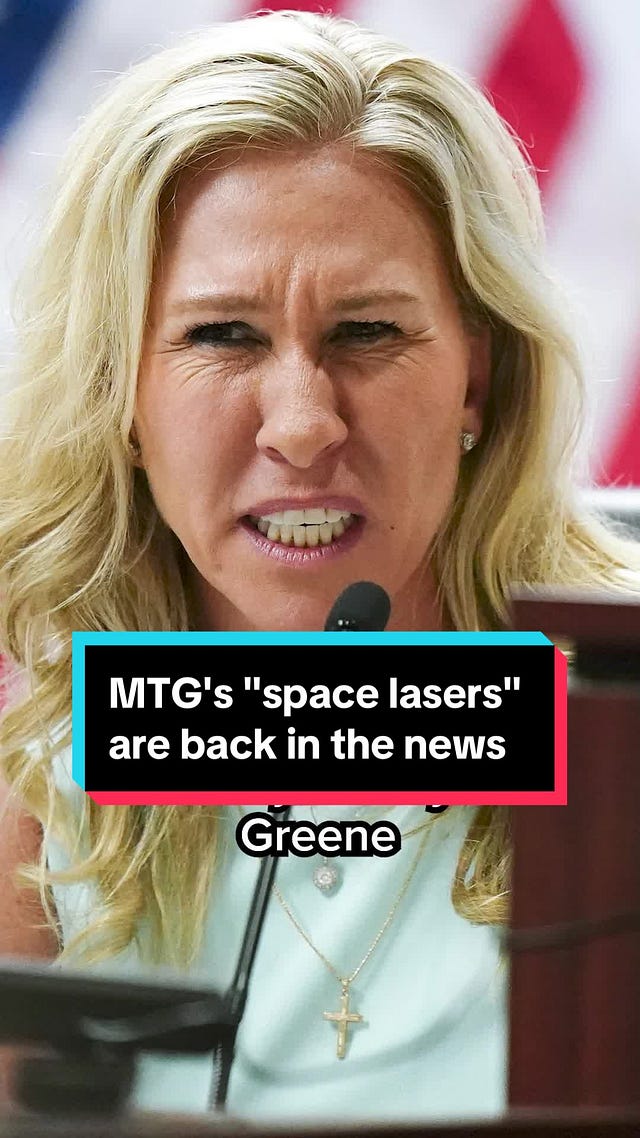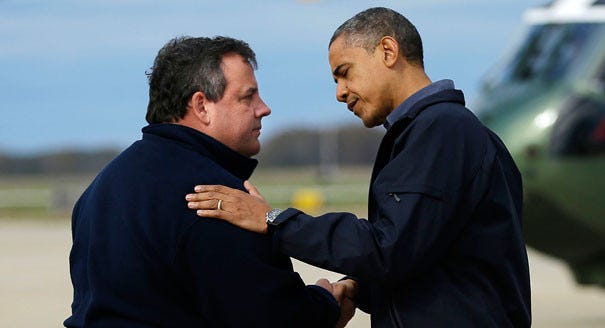
Okay. I’ve just about had it. The system by which Americans (and much of the world) obtains information seems irretrievably broken. Things have deteriorated to the point that we can’t even come together to cope with a massive natural disaster.
The latest high-profile example of our dysfunctional media environment centers on false information disseminated by high-profile politicians and others in the wake of Hurricane Helene, adding to the misery and grieving of those impacted by the flooding.
Entire communities were wiped out by rapid flooding late last month in western North Carolina and portions of several other states in the southeastern U.S. The death count numbers in the 100s but the total is unknown because hundreds more are still missing.
“Yet this devastation and despair is not enough for the extremist groups, disinformation agents, hucksters and politicians who are exploiting the disaster to spread false claims and conspiracy theories about it and the government’s response,” The Associated Press reported.
One of the most prodigious disinformation spreaders was the former president of the United States himself. Among other falsehoods, Donald Trump claimed at a campaign stop Thursday that President Biden was not returning the calls of Georgia Gov. Brian Kemp, that Republican areas were not receiving aid and that the Biden administration “stole” FEMA money “so they could give it to their illegal immigrants that they want to have vote for them.”
As you can see below, Trump campaign officials were indignant that reporters had the temerity to actually practice journalism and look into the dubious claims rather than simply report them and let the political chips fall where they may.
The AP reported that Elon Musk, the owner of Tesla, X and SpaceX, “posted that private relief flights to North Carolina were being blocked by the Federal Aviation Administration, a claim dismissed as false by Transportation Secretary Pete Buttigieg.” This kind of behavior is a habit of the world’s richest man and the owner of one of the largest social media platforms on the planet. That’s quite the powerful combination, no?
All have since been debunked by multiple media outlets, including CNN, CBS News and The New York Times (free link). Kemp himself rebutted Trump’s charge about Biden’s alleged lack of communication. The Republican governors of Virginia, South Carolina and Tennessee all thanked the federal government and described the federal response as fast.
Here is a handy list, mostly of Republican officials in the region, praising the disaster relief effort:
There were also wild claims that federal officials planned to bulldoze land in the worst-hit areas of North Carolina in order to mine lithium and other rare-earth materials for use in making batteries for electric vehicles.
Never to be outdone, Rep. Marjorie Taylor Greene (R-GA) claimed that the federal government controlled the weather to manipulate Helene’s path to hit majority-Republican areas.
It’s not exactly clear who “they” are, or whether Green was merely trying to outdo her earlier suggestion that “Jewish space lasers” had started wildfires in California in 2018:

 Tiktok failed to load.
Tiktok failed to load.Enable 3rd party cookies or use another browser
In the video below, FEMA chief Deanne Criswell showed remarkable restraint by calling the disinformation “frankly ridiculous and just plain false.” I would have used different language, but that’s probably why I’ve never been a government spokesperson.

To counter these falsehoods, FEMA has resorted to launching a Rumor Response page to provide accurate information about disaster relief. So a major federal agency is now compelled to use valuable resources for the purpose of rebutting false claims spread by political vandals during a national emergency. Great.
The editorial board of the Charlotte Observer, the largest newspaper in North Carolina, published an editorial headlined: “Shame on Donald Trump for worsening NC’s Helene tragedy with political lies.”
I’m old enough to remember when responsible people, including politicians and victims alike, put aside their differences when disaster struck. This image comes to mind:
And to be fair, most local officials in the regions affected by Helene were grateful for the aid and generally helped federal officials set the record straight. It appears that the bad actors were mostly from outside the area and were attempting to use the lies about the disaster as a political wedge issue. If so, they succeeded.
Now for the icing on the cake. These false claims and others are amplified on social media posts, state-run media articles and fake online news outlets created by our adversaries, most notably China, Russia and Iran. These nefarious regimes aim to further divide Americans and achieve specific policy goals. For example, Russia is engaging in an active disinformation campaign, ostensibly about immigration, but the real goal is to soften U.S. support for Ukraine.
All three of those nations also used the Israel-Hamas protests on college campuses earlier this year to amplify discord in the United States. Even more ominously, the rise of artificial intelligence has only made the goals of those enemies easier to achieve.
Now the New York Times is reporting (free link) that China, Russia, Iran and Cuba are planning to sow distrust in the upcoming US election results:
“They will likely take advantage of such an opportunity to use similar tactics in a post-election period to undermine trust in the integrity of the election, election processes and further exacerbate divisions among Americans,” the Office of the Director of National Intelligence wrote in an update on election threats.
We are at an insurmountable disadvantage here. If we tried to use the same tactics to sow division among our adversaries, they would simply shout down any means of disseminating the misinformation. For obvious reasons, we can’t do the same thing here. We are, after all, a free country.
To address this problem, we will need a massive education campaign to teach media literacy in our schools and to the general public. Even then, it would be an uphill climb because confirmation bias is so powerful.
Some observers, mostly conservatives, are skeptical of media literacy efforts in schools, arguing in some cases that such courses promote a “woke agenda” and they “worry that some of the measures will undermine parents’ ability to instill their values in their children,”
I am reminded of the recent words of political scientist Ian Bremmer on Facebook:
I know it’s a low bar, but as Hurricane Milton approaches Florida, can we do a little better?








I have to say, I haven't heard much of these "disinformation" statements from high level politicians (i.e., Trump), or the ever-entertaining MTG, trotting out those Jewish space lasers again. Why, oh why, does he say stuff like that? Self serving, I guess. I do have a slightly different take on the Dana Bash/ Lara Trump exchange. I didn't feel that it was so much of an "interview", or attempt to gather opinion and information, as it was a never-ending fact check and gotcha session. First time I've watched it, but I have to say I came away from it with more respect for Lara Trump than I had before. A tad over the top about folks euthanizing their dogs and cats because they can't feed their families, but I guess she was making a point. In a similar vein to JD Vance and the Haitian immigrants eating pets in Ohio. What is it with Republicans and eating small domestic animals? Knock it off! It's giving the more reasonable amongst us a really bad look. Let's all limit our consumption to cows, chicken, and fish and call it a day.
I was extremely interested in your points about digital citizenship but I have to express a disagreement with one of your opinions. I believe you mention that it's primarily conservatives who are having an issue with schools teaching digital literacy because they believe that doing so takes away a parental role. I'm sure there are some knuckle dragging conservatives who share that view, but I am not one of them.
Twelve years ago, before I was a retired educator, I taught media literacy skills through my role as a school library media specialist. I taught lessons on confirmation bias, etc, to students as young as grade 6. I instructed groups in grades 7 and 8 in media literacy units, and for my final year of teaching, I co-taught a course on media literacy with an English teacher to 12th grade students. This had never been done in my district (which you know well) before, and probably since. At the time, this was a new idea in my field, and I felt it was important. Although we had computer science teachers, as far as I know this was new content. No one was teaching manipulating what a student found on a computer--they were teaching how to use a computer--there's a difference. I modified a curriculum very similar to the one referenced in the Fast Company article.
It's all well and good and necessary to teach young minds full of mush (thank you, Rush Limbaugh) when and if and where the information that they've viewing is coming from. But it isn't only the students who need this instruction--it's the teachers as well. In fact, that's even MORE necessary. Here's what happens when an English or Social Studies or even a Science teacher gives an assignment: write an essay about "XYZ". Little Johnny and Sally sit down at the computer and use Google to find articles. The top 3 articles are plagiarized (if they can get away with it) and digested and rehashed into a format that the teacher will find acceptable. Unless there's a librarian involved leading students to reliable sources like databases, this is the quality of the work that has frequently been accepted in American high schools. Perhaps things have changed for the better since my departure from the educational scene, but I'm not hopeful about that. Too many teachers are intellectually lazy. (Wow--harsh!!) It is difficult to teach students how to dissect and analyze where their information is coming from and who has an axe to grind in presenting it to you. It takes constant work, every single assignment. Most teachers don't have the energy or ability to do that. It's too bad that instead of letting librarians help them out, most teachers and administrators think that the only good librarian is one who is stamping out books and running a study hall.
I will get down off my soap box now.